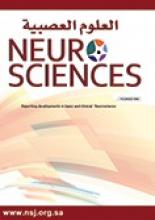Abstract
OBJECTIVE: Exploration of the variable effect of the degree of smoking dependence on psychomotor performance and working memory capacity.
METHODS: This is a randomized, controlled, prospective study conducted in the Department of Pharmacology, College of Medicine, Al-Mustansiriya University, Baghdad, Iraq from 15 January 2011 to25 February 2011. After third stage male medical students completed the Fagerstrom Test for Nicotine Dependence questionnaire, we randomly selected a sample of 32 students and divided them into 3 groups:10 participants with zero score (non-smokers), 11 participants with a score of 5 or less (light smokers), and 11 participants with a score of 6 or more (heavy smokers). Choice reaction time and flicker fusion were measured by the Leeds psychomotor performance test battery, and working memory capacity was measured by the N-back working memory test.
RESULTS: We found significant improvement in ascending flicker fusion test in heavy smokers in comparison with non-smokers (p=0.005, confidence interval [CI] 0.99-6), and light smokers (p=0.053, CI0.39-4.5). Heavy smokers significantly deteriorated in the 3-back task in comparison with non-smokers(p=0.006, CI 4-25.8), and light smokers (p=0.009,CI 3-24.4). No significant changes were seen between groups in the descending critical flicker fusion, the components of choice reaction time, and in 1-, 2- back working memory tests.
CONCLUSION: Heavy smoking (high nicotine) enhances arousal, but impairs working memory capacity.
- Copyright: © Neurosciences
Neurosciences is an Open Access journal and articles published are distributed under the terms of the Creative Commons Attribution-NonCommercial License (CC BY-NC). Readers may copy, distribute, and display the work for non-commercial purposes with the proper citation of the original work.






